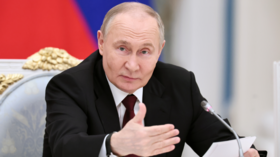Interview with Lara McCoy
Lara McCoy, Deputy Editor of Russia Profile magazine, talked to Russia Today about the consequences and lessons of 9/11 terrorist attack.
Russia Today: The aftermath of that dark day six years ago sent out shock waves around the world, didn't it? On a practical level what's actually changed in these last six years?
Lara McCoy: I would say the biggest change has been the wars in Afghanistan and Iraq, as well as some restrictions on what you can take on an airplane or who you can talk to on the phone or various limitations on what some people consider fundamental freedoms. But obviously the biggest change has been the wars.
RT: The war in Afghanistan, was that judged to be a success?
Lara McCoy: At the time that was very much supported by the American public – much more than the war in Iraq. Al Qaeda is there, let's get them. Six years later we can say that that initiative while positive at the beginning has now shown some retreat. The Taliban is resurgent and there is more opium and heroin coming from the area. As people see that we are not doing well there either and as the war in Iraq drags on, public opinion is falling in terms of that as well.
RT: So many countries around the world, of course, are united in the fight against terrorism. One of the most controversial aspects introduced by President Bush was the Patriot Act, wasn't it? All about getting information from people and how easy it would be to get the information from people. Now that was a very controversial policy that came out after 9/11, 43 days after, in fact.
Lara McCoy: It has become a lot more controversial over time as people learned more about the provisions of the Patriot Act that was pushed through right after 9/11 when people were very patriotic. Whatever Congress wants, whatever the President wants, we are up for that. Now, especially after the Democrats took over the Congress, they've rolled back those provisions a little bit, which I think is probably a good idea. But people are still afraid. I think that sort of fear still exists even now and it is hard to say if these measures have been effective or not because obviously there have been no other major terrorist attacks in the U.S. So how much we are going to give up, in terms of freedom, to be secure I think is still the question.
RT: Hindsight, of course, is a great thing but looking back what mistakes were made, in your view, in the fight against terrorism over these last six years?
Lara McCoy: I personally do think the war in Iraq was a mistake. We went in with too little intelligence as for as whether Iraq was supporting Al Qaeda. Were they then? I think it is very doubtful. Are they now? Absolutely. Has Iraq become a breeding ground for terrorists? I think it's also the case. The U.S. has been done very little over the past six years to rally other countries, especially Islamic countries, in the world to our side. I think we have lost a lot of our international prestige.
RT: We hear time and time again, don’t we, here in Russia and around the world about potential terrorist attacks that have been foiled. Do you think we are in a more dangerous place now in the world than six years ago? Indeed are we more polarized than we were six years ago?
Lara McCoy: I think it is a more dangerous place. I mean, as I have just said, because I think these unpopular missions have produced more terrorists. Are we safer too? I don't know. Yes, they say we have these attacks that have been foiled but that is all we are going to say. We've captured these dangerous terrorists. They've given us information. But what the government's releasing is very very limited. Maybe that is because it is what they need to do for national security. But I think it is also makes it much harder for people to justify these continued restrictions on their own freedom.
RT: Six years on from 9/11. Do you think it is now a time to try to put the memories of what happened on that day behind us, or is it something that in your view which should be kept fresh in our minds?
Lara McCoy: I think as long as the U.S. is waging the war on terror, the global war on terror, 9/11 will be a potent image. Three thousand people died. It was extremely horrific as it was the first time people had really seen commercial aircraft being used in this way. It was a very scary thing. Is it time to move on? Six years is a lot of time. I know that even Michael Bloomberg in New York is saying: “We need to move past this, we are reconstructing this site at ground zero.” A lot of people are still resistant to that and I think it is still a political play. I mean Rudi Giuliani is there today, people say: “Oh, that is because he is a presidential candidate, he needs to keep this image fresh in peoples’ minds to say 'look what I did on 9/11.” So I think that unfortunately it has become more of a political tool than maybe some of the victims’ families would have wanted. It is hard to move past.











